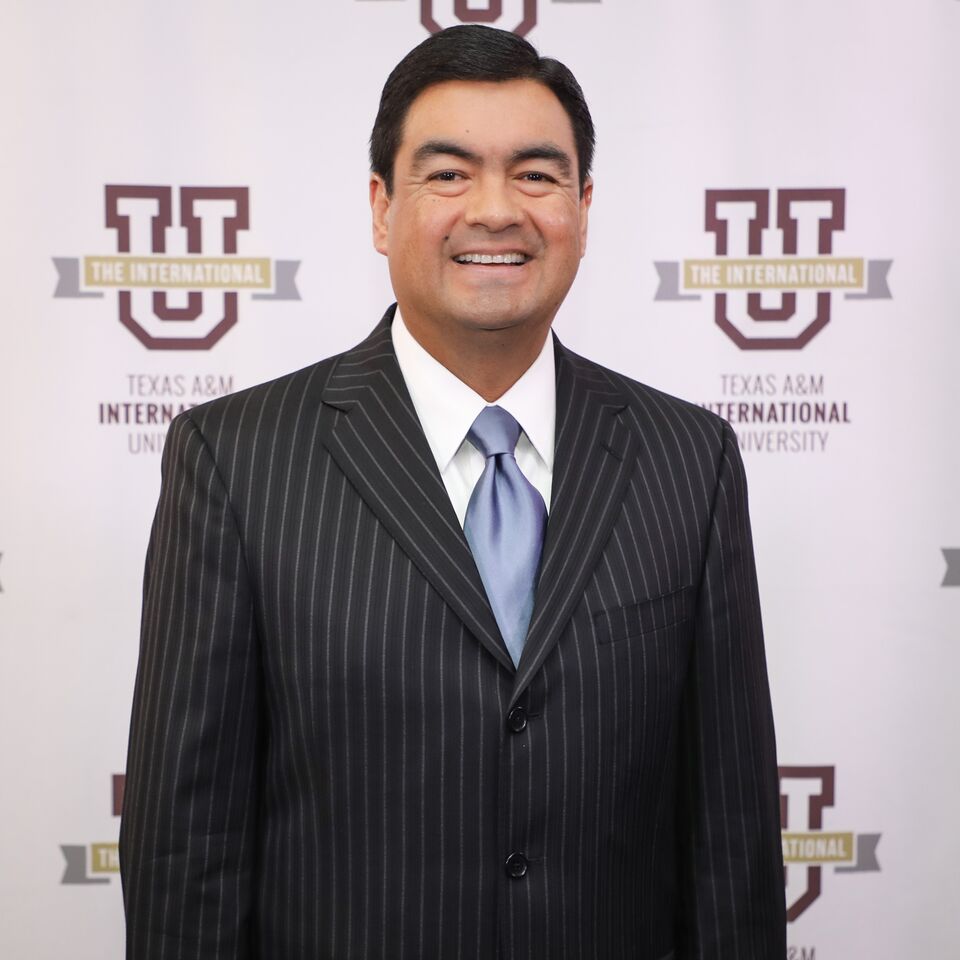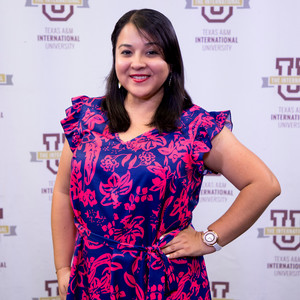Drive to Nurture Future Educators to Lead High-Performing Schools Fuels New TAMIU College of Education Dean

This Fall at Texas A&M International University (TAMIU), new leadership faces are welcoming new and returning undergraduate, graduate students, and faculty.
TAMIU has named four new deans, including the Dean of the College of Education, Dr. Alfredo Ramírez.
Dr. Ramírez’ selection as Dean is the latest in a long and wide arc of educational experiences that has driven him to nurture public school leaders who can create high performing schools in some of the most challenging school settings.
Ramírez says he had only to look at the careers and successes of his father and grandfather to find the drive that has fueled his life in education.
Drawing From Family
“My father is a U. S. Licensed Customs House Broker and holds a degree in Business Administration from TAMIU. He has owned his business since the 1990s, but my maternal grandfather was a public-school teacher and administrator at Laredo ISD for 40 years. He taught at Buenos Aires Elementary School, now Don Gallego Elementary School. He was a WWII Veteran who was drafted while enrolled in high school as a junior entering his senior year. He fought in Germany and got frostbite on all his toes, so they had to be amputated.
“He then came back to Laredo and completed high school as a disabled veteran. He went on to then-Texas A&I University Kingsville to earn a bachelor’s and master’s degree in English and Spanish. He later directed federal programs at Laredo ISD before retiring. I spent most of my summers with him and became immersed in the public-school industry. I fell in love with the profession.
“While I could have gone to work for my father in business, and still can, public education was and still is where my passion is. At UT-Austin in my doctoral program, I learned that the most challenging but rewarding work is in schools that serve predominantly low-socio-economic students of color in large urban settings, and how school leaders can create high-performing schools in some of the most challenging school settings. This solidified what I wanted to do in public education. It still drives me today,” Ramírez explained.
A Career-Changing Report
He said that while he’s advanced through various educational settings and positions, including research on school reform, he believes there is a single catalyst that changed his career.
“The 1966 James R. Coleman Report titled Equality of Educational Opportunity found that the teacher was the most significant factor in student learning over any other factor in the students’ background. The Coleman Report found that variables in the students’ background like family background and socioeconomic status mattered more than school resources or teacher credentials. However, it was the subsequent work in the Educational Productivity Literature by Eric Hanushek in the 1990s that found that one of the most important in school variables that had a significant impact on student learning was the teacher. If you have a good teacher, you will have a good student learning outcome -- no matter the student’s background. The drive to create high-performing schools is what drives me.
“I have also had several mentors and experience in the school administration process that have guided me. People like Dr. Nolan Estes at the University of Texas at Austin held a Ph.D. from Harvard University and served as Assistant Secretary of Education in the Lyndon Baines Johnson administration. He later served as Superintendent of Dallas ISD for 10 years during the desegregation era. He made a big impression on my professional life. I also traveled the state with Texas Commissioner of Education Dr. Felipe Alanis when I worked at the Texas Education Agency in the Division of Continuing Education under a Fellowship that was part of my doctoral program.
“In those days, Rick Perry was trying to get re-elected as Governor of the State of Texas and focusing on the dropout rate in Texas schools was a priority, so I got to travel with Commissioner Alanis and Deputy Commissioner for Dropout Prevention and Initiatives Dr. Paul Cruz to conduct focus groups in large urban areas to see how best we could work on lowering the student high school dropout rate.
Securing his Ph.D. and Research Path
While Ramírez is a proud TAMIU maroon and silver alum, he completed his Ph.D. at the University of Texas at Austin and relocated his family there as he did so...and there may be some orange and white enthusiasm that helped secure that final degree.
“The faculty at the University of Texas at Austin in the College of Education were faculty with a diversity of international and national experiences serving as former school superintendents, university presidents, community college leaders, and higher education leaders... and they were highly inspiring. Likewise, most faculty were also recognized for their research excellence, and I also wanted to become a researcher, and I learned from the best, so this also motivated me,” he explained.
Ramírez’s Ph.D. dissertation and subsequent research has kept a tight focus on the importance of the use of teacher evaluation systems as a means of improving teaching and the learning process.
“As I said, the teacher is the most important factor in improving student learning and student success. The teacher evaluation system or any employee evaluation system, for that matter, is the way that we improve teaching performance. If we improve teaching performance, then we improve student performance. I also work in related fields such as teacher mentoring and teacher professional development as these are also ways to improve teaching which also improves student learning,” he observed.
Ramírez said he believes TAMIU’s College of Education is well-positioned to continue its delivery of high-quality degree programs.
Short and Long-Term Interests
“My predecessor, Dr. James O’Meara, did an outstanding job of growing the College enrollment and there’s a strong foundation to build upon. I hope to continue to focus on navigating that growth very deliberately and make the most of our financial and faculty resources, while never compromising on our quality commitment to deliver only the highest quality degree programs.
“My priorities this Fall semester will focus on immediate College priorities like the promotion and tenure process and ensuring the success of all our state certification processes. The long-term focus will be on acquiring the authority to deliver one or two doctoral programs. This has been a long-awaited desire and need for the College, the University community, and the larger Laredo community as well,” he said.
While there are multiple challenges facing Texas teachers at all levels as they return to Fall classrooms, Ramírez indicated that the College will always marshal its forces to support teachers as they progress in their careers.
“The College of Education can help by providing professional development programs that can help teachers become better educators. We are currently preparing for a Fall 2025 Bilingual Education Research and Practitioner Conference Saturday, September 13. We also provide guidance to teachers who are interested in becoming Nationally Board-Certified Teachers. This is a priority now for schools as the State of Texas has created the Teacher Incentive Allotment as a means of financially incentivizing higher levels of teacher performance. This is not the State of Texas’s first attempt to improve teaching and learning through a financial incentive, but it is certainly the most significant as the merit pay increases are remarkable, in some cases, up to $30,000 additional to teacher salaries,” he said.
Addressing Shared Challenges
Ramírez also noted that the rising tide of technology raises additional challenges, most recently seen in the advent of A.I. (Artificial Intelligence) and generative technology.
“If used correctly, A.I. can certainly become a very effective tool in the teaching and learning process. The most significant challenge is that, like any other new technology, not enough is known about it. We need to provide additional training for teachers so they can learn how to integrate A.I. effectively in the teaching and learning process.
“Our College of Education currently uses a Mixed Realities Simulation (MRS) technology that uses A.I. in association with MRS to better train classroom teachers. This is exciting teaching that allows users to engage with avatars programmed to provide scenarios simulating interviews and classrooms to help teachers excel in a low-threat, high-friendly, and safe environment,” he noted.
Supporting Education Supports the Future
While the future will always be a challenge not easily forecasted, Ramírez said the need to support education and those who will deliver it is essential to the survival of any democracy.
“When our founding fathers wrote the U.S. Constitution, they never mentioned education as a U.S. Constitutional Right. For this reason, public education is not a U. S. Constitutionally protected right. Most people in the United States believe that education is a right, but it isn’t. However, each individual state in the Union recognized that if democracy was going to survive, then the country was going to depend upon an educated citizenry. For this reason, each state adopted education as a state constitutionally protected right.
“In the case of Texas, Texas did not adopt it as a state constitutionally protected right. Instead, they called it an educational ‘benefit.’ So, in Texas, students have a state constitutionally protected right to a public education ‘benefit.’ The TAMIU College of Education prepares future educators to educate students, and by default, they are contributing to this mission of ensuring an educated citizenry to further ensure that democracy survives. From a more practical perspective, the College needs to continue to grow, to graduate certified teachers, and offer competitive degree programs. We also need to contribute to the base of knowledge in education through important research. But yes, the work of all colleges of education is essential to democracy,” he affirmed.
Hitting the Road
To keep up with the high-energy demands of his higher education career, Ramírez puts in some roadwork daily.
“When I am not working, I like to run. On a slow day, I will run five miles. On a good day, I will run 13.1 miles just for fun. I also play the piano at church and sing with the Diocesan Choir in Laredo,” he revealed.
Ramírez offered some words of advice to new and returning TAMIU College of Education students.
“The students who are the most successful begin to prepare early for their state certification exams, and they stay informed and connected with our faculty and staff,” he encouraged.
For more on the TAMIU College of Education’s story, visit www.tamiu.edu/coedu or follow TAMIU social media channels on Facebook, Instagram, LinkedIn, YouTube, and X.


